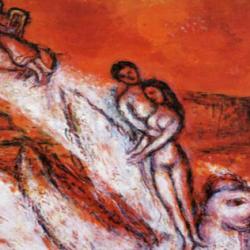The Song of Song depicts a Bridegroom who is passionate toward his bride. Does that Bridegroom portray Yahweh in His love for Israel?
Drawing on Jewish tradition, Nicholas of Lyra interpreted the Song as Israel’s Song concerning Yahweh.[1] If that is accurate, then we may have grounds for concluding that the poem was originally intended as an allegory.
Several lines of evidence point in this direction. Edenic allusions are abundant in the poem, most clearly in the eight uses of the word “garden” (gan; 4:12, 15, 16 [2x]; 5:1; 6:2 [2x]; 8:13), more than in any Old Testament book besides Genesis (13x). The garden of Eden was Adam’s original sanctuary, and the overlay of sanctuary and garden motifs is evident in the Song of Songs. The house is cedar and cypress (1:17), like the temple; the garden is a place of feasting (2:4; 5:1), and the anointing (1:3) and frequent references to fragrances are reminiscent of the sacrificial smoke from the altar.[2]
As Ros Clarke summarizes, “These lovers enjoy sanctuary relationships and engage in sanctuary activities in a place that looks and smells like a sanctuary.”[3] Since Yahweh’s relationship with Israel is often figured as a marriage,[4] and the lovers’ tryst is here taking place in a sanctuary, it is entirely plausible to take the poem, in its original setting, as an allegory of Israel and Yahweh. The poem is about Israel’s yearning love for Yahweh, and about Yahweh’s desire for and delight in His bride.
But we can press this in another direction too, for the Bride herself is a garden (Song 5:1) and Jesus Himself is also temple (John 2:21). The Bridegroom’s yearning for His garden-Bride is then the Son’s yearning to be joined in flesh with His Bride, His yearning for incarnational union with His people. And it is also the Father’s yearning and desire for His well-beloved Son, who has joined with His Bride to rescue her.
Tradition assigns the Song to Solomon, and there is no reason to doubt his authorship. He is mentioned three times in the poem, beginning, middle, and end (1:5; 3:7-11; 8:11-12), and the poem alludes in many particulars to the peace, prosperity, and exploratory wisdom of Solomon.[5] The Bridegroom is explicitly identified as the king (1:4; 1:12-14; 3:6-10), and one traditional line of interpretation sees the poem as a love poem from King Solomon to Abishag the “Shunamite” (= Shulamite, the name reworked into a feminine of Solomon).
Temple references of course fit into this reading of the poem as well. Solomon, of course, is a type of the coming Messianic son of David, and Solomon’s passionate enchantment with his bride reaches ahead to Jesus. Luther believed that the whole Song was political, celebrating the delight that a faithful king takes in the fruitfulness of his people and land. So too, then, it expresses the delight of the final Davidic King in His people.
Passages of the New Testament that allude to the Song provide some additional support for an allegorical reading.[6] The most dramatic and important of these is in Revelation 1:18. John offers a blazon of the “one like a son of man” standing among the lampstands, moving from the robe that reaches to his feet, to the girdle at his breast, to the hair white like wool and snow, to the burning eyes, and then back to the feet that are not as “burnished bronze” (1:13-15). The style, though not the details, is reminiscent of the Bride’s description of the Groom in Song of Songs 5:10-16.
More substantively, Revelation 1:18 reveals Jesus as the “living One” who was dead and now lives, having been given “the keys of death and of Hades.” This is one of four passages in Revelation that use both thanatos and ‘ades (cf. 6:8; 20:13, 14), and these are the only places in the New Testament where these words occur together.
Jesus’ mastery of death and Hades alludes to the programmatic Song of Songs 8:6-7: “Put me like a seal over your heart, like a seal on your arm. For love is as strong as death, jealousy as severe as Sheol. Its flames are flames of fire, the flame of Yah. Many waters will not be able to extinguish the Love, and floods will not wash it away.”[7]
Burning like bronze, Jesus is the incarnate Flame of Yah, the Love that cannot be washed away, the Love that is strong as death and triumphant over the grave.[8]
If Jesus is “the Love” that is as strong as death, He is the bridegroom who is “dazzling and ruddy” to his bride (Song of Songs 5:10). And if He is the Bridegroom of the Song, then He is the one whose heart beats faster at a glance from the eyes of His beloved, the One terrified by the beauty of her glances, the One imprisoned in her tresses, the One whose desire is for His bride, the One who virtually becomes His desire for His bride.
If Jesus is the Bridegroom, in short, His love for His Bride is Eros and not mere Agape. He comes to His Bride because He wants her and the pleasant fruits of her garden, because He is transported by her beauty.
(Painting by Aharon April.)
[1] Turner, Eros & Allegory, 114-115.
[2] On Eden in the Song, see Francis Landy, “The Song of Songs and the Garden of Eden,” Journal of Biblical Literature 98:4 (1979), 513-528; and Ros Clarke, Song of Songs: A Biblical Theology (M.A. Thesis, Oak Hill College, 2006; available at www.beginningwithmoses.org/articles/songofsongs.htm, accessed October 20, 2009.
[3] Clarke, Song of Songs, 28.
[4] See Seock-Tae Sohn, YHWH, the Husband of Israel (Eugene: Wipf & Stock, 2002); Nelly Stienstra, YHWH is the Husband of His People (Kampen: Kok, 1993), both summarized by Clarke, Song of Songs, 41-43.
[5] A thorough assessment of the evidence may be found in Christopher Mitchell, The Song of Songs, (Concordia Commentary; St. Louis: Concordia, 2003), 98-116.
[6] I’m reliant here on the extensive review of New Testament allusions to the Song found in Mitchell, Song of Songs, 29-34.
[7] The translation of the latter part of the verse is from Mitchell, Song of Songs, 32.
[8] Mitchell (Song of Songs, 33) suggests that the reference to “mighty waters” also links the passages. Jesus speaks with the voice of many waters (Revelation 1:15), but many waters cannot quench love.












